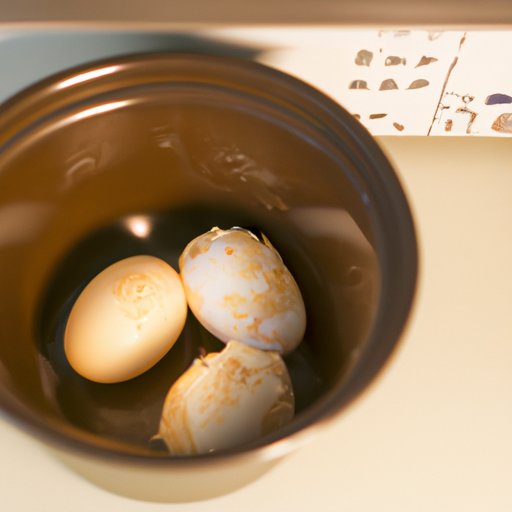
I. Introduction
Boiling eggs can often be a tedious and time-consuming task. Many people resort to the stovetop method, which can take up to 12 minutes to achieve hard-boiled perfection. However, did you know that you can boil eggs in the microwave? This alternative method is not only time-efficient but also energy-efficient. In this article, we will discuss how to boil eggs in the microwave and explore the benefits of this cooking method.
II. Step-by-Step Guide for Boiling Eggs in the Microwave
Before we delve into the step-by-step process, ensure that you have the necessary materials and equipment needed:
- Eggs
- A microwave-safe bowl
- Water
- A microwave
Once you have gathered the materials, it’s time to prepare before microwaving the eggs:
- Fill the bowl with water depending on how many eggs you are boiling and how soft or hard you want your eggs.
- Place the eggs inside the bowl filled with water. Make sure the eggs are fully submerged in water.
- Cover the bowl with a microwave-safe lid or plastic wrap. This helps to prevent any water from evaporating and the egg from exploding in the microwave.
Follow these steps to microwave the eggs:
- Microwave the eggs on high for approximately 1 minute and 30 seconds for a single egg, 2 minutes and 30 seconds for two eggs, and 3 minutes and 30 seconds for three eggs.
- Once the time is up, let the eggs sit in the water for an additional two minutes before removing them with a spoon, ladle, or fork, any utensil would be good for this part.
- Place the eggs in ice water for 2 minutes to prevent overcooking and to make them easier to peel.
III. Dos and Don’ts for Boiling Eggs in the Microwave
Now that you know the step-by-step process for boiling eggs in the microwave, here are some tips to ensure that your eggs are microwaved safely and efficiently:
- Always start by placing the eggs in cold water. This helps to prevent the eggs from cracking.
- Make sure to cover the bowl with a microwave-safe lid or plastic wrap to prevent any water from evaporating and the egg from exploding in the microwave.
- Experiment with microwave settings to achieve your desired texture and consistency. Every microwave is different, so adjust the timing to your preference.
- Do not overcook the eggs as they may explode or become rubbery. Always err on the side of caution and start with the minimum time for the number of eggs you are microwaving.
Some common mistakes to avoid when boiling eggs in the microwave include:
- Using a non-microwave safe bowl or utensils, which can lead to burnt fingers or even a fire.
- Leaving the eggs uncovered, which can lead to the water evaporating and the egg exploding in the microwave.
- Overcooking the eggs, which can lead to a rubbery texture.
IV. Comparison between Boiling Eggs in the Microwave versus on the Stove
There are advantages and disadvantages to both methods of boiling eggs. Here are a few things to consider:
- Microwaving eggs is a quicker process, with an average cooking time of 2-4 minutes versus 10-12 minutes on the stove.
- The stove allows for cooking larger batches of eggs at once, while the microwave method is better suited for smaller quantities.
- The texture and consistency of the eggs vary between the two methods. Microwaved eggs tend to be softer and less rubbery than stove-boiled eggs.
V. Guide on How to Cook Different Styles of Eggs in the Microwave
Did you know that you can also cook other styles of eggs in the microwave? Here’s how to achieve different textures:
- Hard-boiled eggs: Follow the step-by-step guide above and microwave your eggs for 6-8 minutes depending on the size and number of eggs. Let them sit for an additional 2 minutes in ice water before peeling.
- Soft-boiled eggs: Microwave your eggs for 2-4 minutes depending on size and preference. Let them sit for an additional minute in ice water before peeling.
- Poached eggs: Place an egg in a microwave-safe container with 1/4 cup of water and microwave for 1-2 minutes depending on your microwave’s power. Use a slotted spoon to remove the egg from the water and enjoy!
- Scrambled eggs: Whisk 2 eggs in a microwave-safe bowl and microwave for 45 seconds. Stir the eggs and microwave for an additional 30-45 seconds or until cooked to your preference.
VI. Recipe Ideas for Boiled Eggs Cooked in the Microwave
Boiled eggs are a versatile ingredient that can be utilized in many recipes. Here are a few ideas to get you started:
- Add boiled eggs to a salad for a protein boost.
- Mash boiled eggs with avocado and season with salt and pepper for a healthy breakfast or snack.
- Make a classic egg salad sandwich with boiled eggs, mayonnaise, mustard, and diced celery.
- Use sliced boiled eggs to top a bowl of ramen or pho.
VII. Benefits of Cooking Eggs in the Microwave
There are many benefits to microwaving eggs:
- It’s a time-saving cooking method that can be done in 2-4 minutes.
- Microwaving eggs is an energy-efficient cooking method that uses less water and electricity than boiling eggs on the stove.
- Eggs are a nutrient-dense food, providing a healthy source of protein, fat, and essential vitamins and minerals.
VIII. Conclusion
In conclusion, boiling eggs in the microwave is an easy and quick way to cook eggs. By following our step-by-step guide, you can achieve your desired texture and consistency. Remember to microwave eggs safely and efficiently by using microwave-safe bowls and utensils, covering the bowl with a lid or wrap, and experimenting with different cooking times. With boiled eggs being a versatile ingredient in many recipes, there are many ways to enjoy your microwaved eggs.




